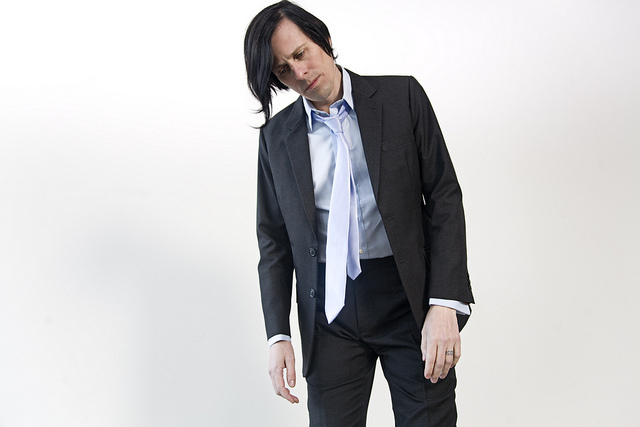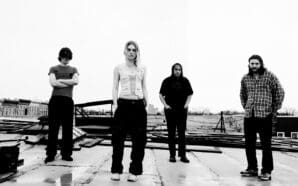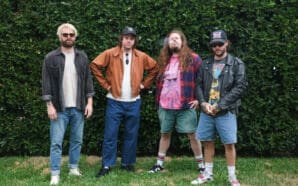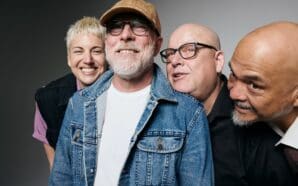If you ever find yourself thinking, “Whatever happened to Ken Stringfellow?” it’s likely because you’re looking in the wrong places… places from which Ken has currently moved on from, or yet to return to. He’s been on the music scene for more than two decades now, most famously fronting indie poppers and DGC-legends The Posies since the late 80s. He was also in R.E.M. for about half a decade, beginning in the late 90s. He’s also been a card-carrying member of Big Star and The Minus 5 (in addition to collaborating with a number of very notables, mentioned below). He also does quite a bit of producing and arranging. His fourth solo album, Danzig in the Moonlight, was released last month on Spark and Shine. I would tell you about why the release is noteworthy, but, I recently got a chance to talk to Mr. Stringfellow, and he says it far more eloquently than I could…
Izzy Cihak: How would you characterize your latest, Danzig in the Moonlight?
Ken Stringfellow: A diverse, challenging, dense musical journey…a multipolar expansion of all I’ve learned, experienced, and developed over the last eight years, since my last solo album (2004’s Soft Commands). I’ve been working a lot as a producer, arranger, engineer, player, writer…and this experience has given me a much bigger vocabulary to express my thoughts and ideas. In fact, when critics have had criticisms, the best they can come up with is “too interesting.” I think the genre jumping that I do is part of the fun. Hopefully listeners will agree.
IC: I have to ask, what was it that inspired the name? Was it the metallic crooner or the place in Poland? Or was it intended to be intentionally (and possibly comically) ambiguous?
KS: Well, anyone with a song title like “History Buffs” on their album is probably looking a little deeper than the pseudonym of a punk/metal singer. I wasn’t sure myself, why this dumb joke on the King Harvest song title was so appealing but, as I trust my subconscious implicitly, I stuck with it. And subsequent research reminded me of the Free City of Danzig, the status that modern-day Gdansk enjoyed between the wars. Fought over by empires for countless centuries, the Allied powers decided it shall remain an independent entity, no longer subject to the machinations of Germany, Poland, Russia, etc. Comprised of many cultures and influences, but belonging to no nation–it’s a great metaphor for how I see myself, culturally.
IC: What were the albums’ biggest influences, whether musical or otherwise?
KS: Apocalyptic hysteria, as expressed in my meditations on the end of the world in “4am Birds/The End of All Light/The Last Radio” and the post-apocalypse sadness of the lonely God in “Odorless Colorless Tasteless,” 20th century music, which makes its way into that song, and my explorations of ontology, teleology, cosmology, the earthly mask of the cosmic God, and so on. Philip K. Dick writes about this extensively in his novels and his “Exegesis,” recently published.
Musically, beyond the 20th century avant-garde composers, there’s references detectable to Wilco, who mix organic and post-modern influences very well indeed; Emily Haines, who makes piano ballads that transcend the genre and remain challenging and modern; The Smiths, Bright Eyes, many things are in the washing machine, the colors running into each other. The cover and its complete world in miniature, which is what the album intends–it has earthly beginnings, and the end of the universe all within its themes–was influenced by one of my favorite films of all time, the Argentine film La Antena (called the Aerial in English).
IC: What else are you currently working on? You always seem to have several projects in the works at once.
KS: You’re not wrong. I have tons of mixing and production projects going on, but I should mention one album that was recently released by EMI in Holland, by singer Carice van Houten. You know her as Melisandre on Game of Thrones and for acting in many films, but she’s made an album as a vocalist and it’s stunning, a masterpiece, really. I helped produce, write, and play on the album. There’s contributions from Marc Ribot, Steve Shelley, Antony, Howe Gelb, and also the core musicians from Holland who play on my album.
IC: Over the years you’ve collaborated with a lot of different (and varied) bands and musicians. Is there anyone that you would love to collaborate with, with whom you haven’t yet had the chance, whether entirely realistic or not?
KS: Hey, after so many unrealistic things have happened–I’ve worked with a Beatle, one of Led Zeppelin’s members, Neil Young…my idea of what’s realistic is forever altered. It’s all out there, closer than you think, and I want to say that, not just for my own weird and seemingly special case, but for anyone: Dream big. So, my dream: to work with Wes Anderson on a composition project for a film. I think his sensibilities and mine would go very well together. I would say the same for Mark Mothersbaugh, and they’ve worked together a great deal, so…let’s say that to be somehow working with them on something would be the ultimate dream.
I’ve tried to rope Michael Andrews in for working on something a few times, I tried to hook up with him for this album but he’s super busy. I think we’d enjoy the experience though, so, he’s on the list of ‘hopefully soon’ too.









